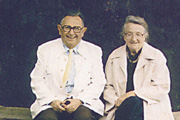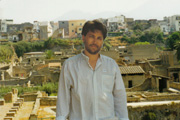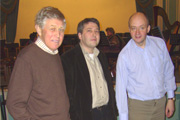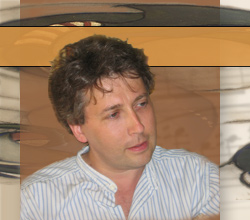 |
 |
 |
                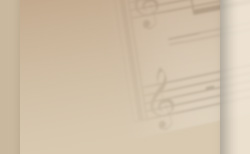 |
jamesfrancisbrown.com Biography
Growing up with music
Formal Education Composition at the Royal Academy Early Career and Finding a Creative Voice The New Millenium and New Directions Life at Home Growing up with musicMany of my earliest and happiest recollections are imbued with the presence of music; from hearing my Mother singing nursery rhymes and sitting by the pedals of the piano as my Father played old songs in his particular way, embellishing and adjusting harmonies to suit his technique. My parents provided the most natural and encouraging environment for happy creativity. As a family we were always making things and telling stories and from the age of five or six I started to make up little tunes on the piano and finding harmonies to match. Perhaps I thought that this might be easier than trying to learn something by someone else! I still have the same sense of excitement about discovering music as I did then, a feeling that is encapsulated by an experience I had when I was around seven years old. I was sitting at the piano on a rather grey day; doodling with an idea and sensing something emerge, when suddenly the sun came out in full glory. From that day I have perceived music as a force of nature. Formal EducationThings progressed in an informal way until, at the age of eleven, I won a schools competition to provide a gift to mark the birth of HRH Prince William of Wales. I had the idea of composing a lullaby and was thrilled when it won the competition and I received an encouraging letter from Buckingham Palace assuring me my little piece was having the desired effect! janeiro brazilian hair reviews mink hair wigs latex dress trendsgal human hair wigs how to cut ponytail extensions latex dresses
It was now felt that I needed more systematic help with musical theory and compositional techniques. I was fortunate enough to gain a scholarship which enabled me to study composition with Hans Heimler who lived in Guildford. This was a turning point. Hans had studied composition with Alban Berg and conducting with Felix Weingartner before escaping the Nazi regime in the late 1930s. Hans was a wonderful man who possessed a great breadth of knowledge - not confined to music, although it sometimes seemed that he knew every piece of music that had ever been written. He presented so many possibilities to my eager mind but was sensitive enough to help my own voice emerge. Despite growing up in the milieu of Schoenberg and the Second Viennese School he was a great admirer of English composers and counted among his friends composers such as Ralph Vaughan Williams, Michael Tippett and Alan Rawsthorne. Hans always insisted that it was more important to learn by 'listening' to music than to learn by 'looking' and that what registers on the ear is crucial. He could certainly be stern in his criticism, often subjecting pages of my music to a slash of red pen. On reflection, he seemed to have an uncanny ability to detect waffle and inconsistency. We always completed the lesson by playing piano duets and then consuming vast amounts of what became known as 'James cake' which Hans's English wife, Elizabeth, had made. Hans treated me as a colleague from the start - to the extent of sometimes forgetting that I was, in fact, a schoolboy. Once, at the end of an exacting lesson he, not entirely absent-mindedly, offered me a choice of his finest cigars and - I accepted! Those were the days! I continued visiting 'uncle' Hans until his death in 1998 - by which time I had finished my formal education and had determined to make my way as a composer. I'll always be grateful for his life-enhancing nature and his encouragement. Indeed, his belief in me sustained me through many periods of self doubt and provided some perspective in the face of criticism - whether from without or within. Composition at the Royal AcademyIn 1988 I entered the Royal Academy of Music to study composition with Roger Steptoe and piano with Hamish Milne. At that stage I was seriously considering a career as a pianist - putting in many hours of practice. My priority, however, was always composition and I began to realise that my desire to perform was not as strong as my desire to create. Perhaps the most fruitful aspect of my time at the Academy was meeting composers such as Peter Fribbins, Matthew Taylor and Alan Mills who were my near contemporaries there. I have the highest regard for these composers who have become firm and inspiring friends. Their attitudes, convictions and music continue to resonate with me, despite some natural differences in our musical personalities. Early Career and Finding a Creative VoiceOn completing my studies at the Academy in 1991 I had to face the realities of earning a living - not an easy path for a composer! Fortunately, I secured a teaching position at a local independent school which enabled me to pay the bills while continuing to compose. In 1994 I wrote a viola sonata for Sarah-Jane Bradley which was performed at the Malvern Festival. Sarah-Jane, another great friend and kindred spirit from my days at the Academy has always been a wonderful supporter, advocate and interpreter of my music. As a founder member of the Leopold String Trio, one thing led to another and she asked me to write a String Trio for performance at the 1996 Deal Festival. This was how I came to meet the composer David Matthews (then the director of the Deal Festival) who was soon to become one of my closest friends and most valuable of mentors. I began to realise that his generosity of spirit, love of English music and independence within the field of contemporary music was a significant compensation for the loss of Hans although he is, of course, much nearer to my own generation. Our views are similar - that it is certainly still possible to write large-scale tonal music with conviction and life and that although the so-called avant garde continues to generate interesting possibilities it is by no means the only way. During the 1990s I continued working in the field of chamber music, writing for some superb musicians and continuing to find my creative voice. Towards the end of the decade I was asked by Faber Music to contribute a work to their Millennium series. The result was my Sinfonietta which was performed by the London Chamber Orchestra under Christopher Warren-Green. This work was something of a watershed for me. Focusing the attributes of a four movement symphony into a single movement work heralded a phase of concision which is still a preoccupation for me. Indeed, my next work, the Fantasy for Violin and Orchestra for Jack Liebeck and the English Chamber Orchestra, written at the same time, was also a highly compressed work. The New Millenium and New DirectionsNESTA FellowshipBy the turn of the century I had written in many genres and was keen to write more orchestral music. However, my teaching commitments were such that I didn't have much time for composing large-scale pieces. At this point, it seemed providentially, I was thrilled to be nominated anonymously for a Fellowship under the National Endowment for Science, Technology and the Arts (NESTA). The Fellowship offered five years for me to write music and continue my studies away from the demands of my very heavy teaching schedule. Presteigne FestivalAround the same time I started visiting the Presteigne Festival which takes place every August in a small and charming town on the borders of Wales and Herefordshire. Under the inspired directorship of George Vass the festival has become a new must for music lovers who appreciate the notion that new music ought to be a natural and enriching inclusion in programming. Composers of various artistic persuasions meet and hear each other's music in a spirit of camaraderie and are always welcomed by the audiences. So it feels like a natural home to many of us - something of a beacon during the long hours of creative effort and particularly in an age which appears to have marginalised such endeavours. Orchestral WorksSo my Fellowship commenced in 2003 and coincided with a series of commissions for orchestral works. There was a collaborative tribute to Vaughan Williams for the Three Choirs Festival and the Philharmonia Orchestra under Martyn Brabbins (this led to my first BBC broadcast - again under Brabbins but with the BBC Scottish SO) a Trio Concertante and a Clarinet Concerto for Presteigne. My symphonic poem 'Prospero's Isle' (recasting of an earlier work, written for the cellist Gemma Rosefield) was completed for a performance in St Petersburg with the State Academic Symphony Orchestra conducted by Matthew Taylor. Also, through NESTA I benefited from the excellent advice from my mentors, Iain Ritchie and Paul Hughes - both with a keen sense of how to help a probably naive composer through the pitfalls of a life in music! In 2006 I was commissioned by the Royal Opera House to work on a most intriguing project. Sketches of an early comic opera by Wagner had come to light and it was felt that enough material existed to provide a satisfying reconstruction (follow the link for the complete story) so I set about it with alacrity! It was marvellous to hear Ailish Tynan and Robert Murray, with the ROH Chorus and the Southbank Sinfonia bring this work to life in October 2007! Festival CommissionsChamber music continued to preoccupy me throughout this period and in 2006 I was invited by Steven Isserlis to be the first composer-in-residence at the International Musician's Seminar in Prussia Cove, Cornwall. Working with musicians of such high calibre and dedication is always rewarding. I count my relationships with artists such as Jack Liebeck, Gemma Rosefield and Anthony Hewitt, amongst many others, as particularly important and, I hope, mutually supportive and encouraging. These fine musicians have certainly shown great commitment to my music. Since childhood I have found a great deal of imaginative stimulation amongst the Cumbrian Fells. My year would not be complete with a period of 'losing' myself in those hills. So it seemed a kind of spiritual home-coming when I was asked to be composer-in-residence at the 2009 Ulverston International Music Festival. This festival is fast becoming a major national event and it was very exciting to be a part of such an ambitious and inspiring venture. Life at HomeI'm quite sure I couldn't have achieved many of my artistic aims without the support of my wife Jane who is not only extremely patient and understanding but is also (as I am sure her artists at Harrison Parrott will testify) incredibly organised! We met in 1990 and found a house in Redhill, Surrey in 1994 where we still live. The birth of our daughter, Eleanor, in 2007 was, as most people seem to observe, a transforming moment in our lives. She is an absolute delight - very funny and rather musical! We spend as much time as we can at the family cottage in Ingworth, Norfolk. The cottage is surrounded by cornfields, broad, open skies and quiet lanes and is the perfect place to have ideas. Although most of my more intensive work goes on in Surrey, I always find a trip to Ingworth refreshing and stimulating to my imagination. |

|

